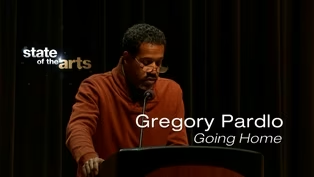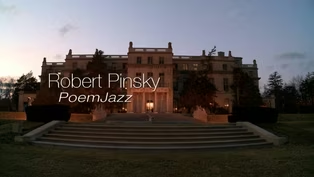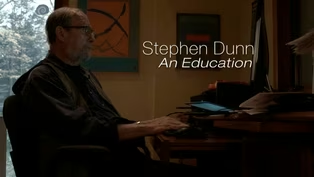State of the Arts
Poet Brenda Shaughnessy
Clip: Season 41 Episode 7 | 6m 47sVideo has Closed Captions
Poet Brenda Shaughnessy at the Dodge Poetry Festival and at Rutgers University-Newark.
Producer Bob Szuter met poet Brenda Shaughnessy at the biannual Geraldine R. Dodge Poetry Festival where she was a featured performer. It’s the largest and most prestigious gathering of poets in North America. He visited Brenda’s MFA class at Rutgers University-Newark, where she described her five basic rules for aspiring poets, including some intriguing advice!
Problems playing video? | Closed Captioning Feedback
Problems playing video? | Closed Captioning Feedback
State of the Arts is a local public television program presented by NJ PBS
State of the Arts
Poet Brenda Shaughnessy
Clip: Season 41 Episode 7 | 6m 47sVideo has Closed Captions
Producer Bob Szuter met poet Brenda Shaughnessy at the biannual Geraldine R. Dodge Poetry Festival where she was a featured performer. It’s the largest and most prestigious gathering of poets in North America. He visited Brenda’s MFA class at Rutgers University-Newark, where she described her five basic rules for aspiring poets, including some intriguing advice!
Problems playing video? | Closed Captioning Feedback
How to Watch State of the Arts
State of the Arts is available to stream on pbs.org and the free PBS App, available on iPhone, Apple TV, Android TV, Android smartphones, Amazon Fire TV, Amazon Fire Tablet, Roku, Samsung Smart TV, and Vizio.
Providing Support for PBS.org
Learn Moreabout PBS online sponsorship[ Music plays ] Shaughnessy: Thank you for coming out on this morning.
It's such a pleasure to be at Dodge.
It really it's just an honor and a blast to.
I was weeping almost all day yesterday.
It was so good.
[ Laughter and applause ] Artless is my heart.
A stranger berry there never was, tartless.
Gone sour in the sun, in the sunroom or moonroof, roofless.
Narrator: For Brenda Shaughnessy, poetry is a deeply personal exploration of what she calls the real stuff of life.
The struggle between heartbreak and joy is most notable in her acclaimed third book, "Our Andromeda."
Shaughnessy: If anything does characterize my work overall, it's that there's no experience, it's all one thing.
You know, it's not -- there's not just sadness that overtakes you and there's no moment of joy.
There's never just joy within, you know, without any kind of critical central vein of despair.
The first book, "Interior with Sudden Joy," is a book of love poems.
It's basically just a book about lesbian love gone wrong and terrible heartbreak, the kind of heartbreak that just made me feel like I couldn't go on.
And poetry really did feel like it was saving me then.
The second book is called "Human Dark with Sugar."
In between heartbreak and death and joy, I tried to use humor to talk a lot about my uncertainty with what sort of -- what the stuff of life actually was.
There's a darkness there, and then I kind of hint, you know, a hit of sweetness.
And so then the third book, "Our Andromeda," was really a change for me.
When my son was born, there was a really terrible accident at the birth and it was a very -- it was a disastrous injury that he suffered.
And he survived, and he's seven years old now and he's wonderful.
I was so glad to have a 20-year practice of poetry behind me because I felt like this really bad thing happened and I don't know how to see out of it.
There's no other way to do this but pushed through it in poetry.
I just wrote and wrote and wrote and wrote, and it was this amazing express of crying and writing at the same time, Like, I was writing while crying.
"Our Andromeda" has to deal with the notion of alternate realities, alternate selves, doubles, twins, sisters.
The book is all about that.
What if this didn't happen on Andromeda, our sister galaxy?
It's possible that we could have been the same exact doubles of ourselves, just that the thing wouldn't have happened to my son and he would be healthy.
Both the heartbreak and the incredible generative world making power of poetry.
They both just came together in this book for me.
That's what I learned.
Miracles.
"I spent the whole day crying and writing until they became the same as when the planet covers the sun with all its might.
And still I can see it.
Or when one dead body gives its heart to a name on a list.
A match, a light, sailing a signal flare behind me for another to find.
A scratch on the page is a supernatural act.
One twisting fire out of water, blood out of stone.
We can read us.
We are not alone."
This poem doesn't take responsibility for anything.
I mean, it was like the moment.
We don't have any context, We don't... Narrator: Brenda is also an associate professor at Rutgers-Newark, and it's this approach of working with the real stuff in life that she brings to the classroom.
Shaughnessy: ...just about to happen, Miss, that actually makes me more dizzy than the actual description of it.
I teach in the Rutgers-Newark MFA program, and our graduate students are very committed to their poetry.
There are people who've already decided this is for me, I'm doing this.
I need to figure out how to create some practices for myself so that I can pursue this.
Well, that yielded something gorgeous.
Woman: Yeah.
Shaughnessy: I have these sort of very condensed five tips.
I give them to my students because I've learned that I need them myself.
So... You think that's a great idea for a poem, but the poem isn't an idea.
The poem is a physical action.
You have to do this or this or there is no poem.
There's so much knowledge.
I call it the back brain, that there's way more back there than you have access to generally.
Your poetry can find access to them.
Three, stare at something, anything, right in front of you.
And don't scan and search looking for something poetic.
That's the first thing you have to do to start to write a poem.
It's a great exercise because it forces you to defamiliarize what you see every day.
Sounds like you're giving yourself some kind of weird spiritual title, but it's a practice.
And the practice is the identity.
And if you write poetry, you call yourself a poet because that naming has power.
It means that there's something about that subject that is important to you.
It's the kind of thing where you might actually spend your whole life writing around to, against, with that fear.
Woman: You know, the man who who approaches him... Shaughnessy: Working with emerging poets, trying to communicate the necessity of bringing the real stuff of you to the page and to the class, that's really hard.
The truth is we don't really like going to the bad places.
We like to believe that we're kind of in control of things.
If bad things happen to us, we're sort of over them.
And poetry forces us to not just sort of acknowledge those cracks, but to actually pull them apart and go, you know, what's in there?
How deep does that go?
What started them?
What is the seismic activity that still rocks this person?
So it's unfortunate, but I do tend to say to them, if it hurts, that's where you should be going.
Video has Closed Captions
Clip: S41 Ep7 | 3m 31s | Pulitzer Prize-winner Gregory Pardlo, poet, returns to to his hometown in New Jersey. (3m 31s)
Video has Closed Captions
Clip: S41 Ep7 | 5m 39s | Meet two-time US Poet Laureate Robert Pinsky in his hometown of Long Branch, NJ. (5m 39s)
Video has Closed Captions
Clip: S41 Ep7 | 6m 10s | Pulitzer Prize-winning poet Stephen Dunn returns to Stockton University. (6m 10s)
Providing Support for PBS.org
Learn Moreabout PBS online sponsorship
- Arts and Music
The Best of the Joy of Painting with Bob Ross
A pop icon, Bob Ross offers soothing words of wisdom as he paints captivating landscapes.













Support for PBS provided by:
State of the Arts is a local public television program presented by NJ PBS



